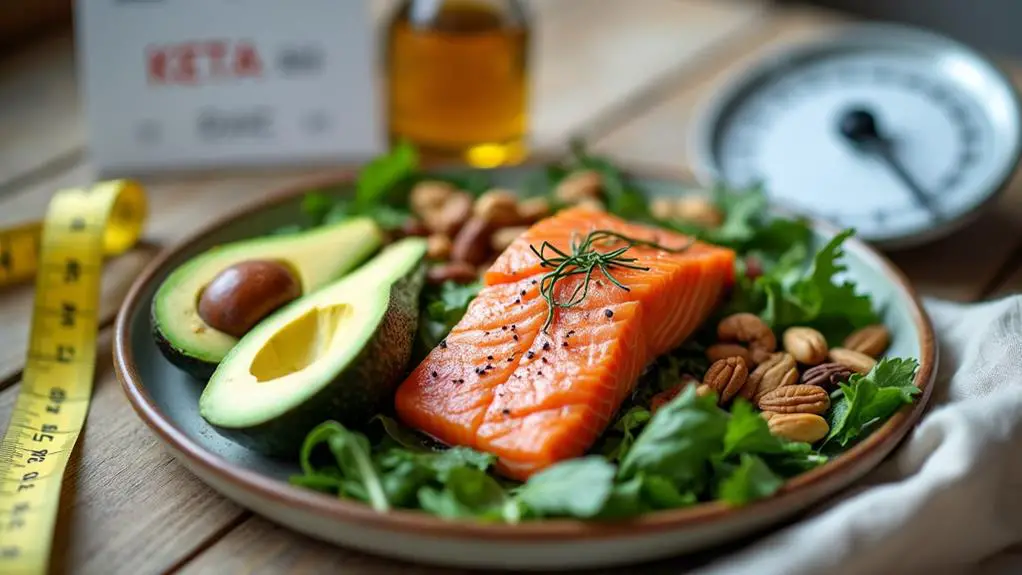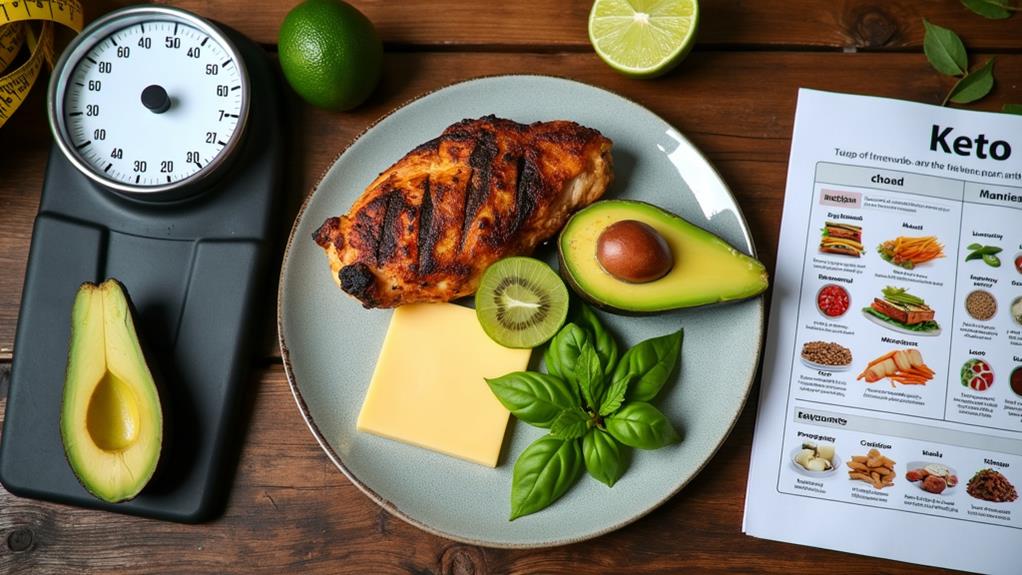
The ideal caloric intake on a keto diet varies based on your Basal Metabolic Rate (BMR) and Total Daily Energy Expenditure (TDEE). Typically, women should aim for 1,500 to 1,800 calories per day, while men should target 1,800 to 2,200 calories, alongside strict carbohydrate limits of 20-50 grams daily. To achieve weight loss, creating a daily caloric deficit of 500-750 calories is recommended. Accurately calculating and monitoring your caloric needs guarantees effective and sustainable weight management. Furthermore, understanding how to adjust these values can greatly optimize your ketogenic journey for long-term success.
Key Takeaways
- Daily caloric intake on a keto diet should be 1,500-1,800 calories for women and 1,800-2,200 calories for men.
- Aim for a daily caloric deficit of 500-750 calories to achieve effective weight loss.
- Limit net carbohydrates to 20-50 grams per day to maintain ketosis.
- Regularly monitor and adjust your calorie intake based on changes in weight and activity levels.
- Use food diaries or calorie-tracking apps to ensure you stay within your daily caloric limits.
Understanding the Keto Diet
Initiating a thorough understanding of the ketogenic diet, it is essential to recognize its foundational principles, which include a high fat intake, moderate protein consumption, and a markedly low carbohydrate allowance. Specifically, the diet comprises 70-80% of total daily calories from fats, 10-20% from proteins, and a minimal 5-10% from carbohydrates, often equating to less than 50 grams per day. This macronutrient distribution aims to induce ketosis, a metabolic state where the body switches from glucose to fat as its primary energy source, producing ketones in the liver.
The ketogenic diet promotes weight loss by utilizing fat for energy, which leads to rapid fat loss instead of relying on carbohydrates. Despite its growing popularity, several keto misconceptions persist, particularly regarding its dietary sustainability. Critics often argue that the restrictive nature of the diet makes long-term adherence challenging.
However, empirical evidence demonstrates that with careful planning, individuals can maintain balanced nutrition without compromising their health. Approved foods such as avocados, nuts, seeds, oils, fatty fish, and non-starchy vegetables provide essential nutrients while adhering to keto principles.
Research supports the diet's efficacy in weight loss and health improvements, showing significant reductions in weight, insulin levels, and waist circumference. Consequently, understanding and applying these principles is vital for achieving the desired health outcomes while maintaining dietary sustainability.
Determining Caloric Needs
To determine caloric needs on a keto diet, individuals should start by calculating their Basal Metabolic Rate (BMR) using formulas like Mifflin-St. Jeor, which takes into account age, weight, height, and sex.
Next, incorporating activity levels via multipliers ranging from sedentary to highly active provides an accurate Total Energy Expenditure (TDEE).
Calculate Basal Metabolic Rate
Calculating Basal Metabolic Rate (BMR) is a fundamental step in determining your caloric needs on a keto diet. BMR calculations are crucial because BMR represents the number of calories your body requires at rest to maintain essential functions such as breathing and circulation, accounting for about 60-75% of total daily energy expenditure.
Understanding your BMR significance helps tailor your dietary intake to align with your metabolic needs.
To estimate BMR, the Mifflin-St. Jeor equation is often used. For men, the equation is: 10 x weight (kg) + 6.25 x height (cm) – 5 x age (years) + 5. For women, it is: 10 x weight (kg) + 6.25 x height (cm) – 5 x age (years) – 161.
This method provides a reliable approximation of your basal caloric requirements. Alternatively, the Katch-McArdle formula, which is beneficial for those with known body fat percentage, calculates BMR as 370 + (21.6 x lean body mass in kg).
Regular monitoring and recalibration of BMR are crucial since changes in weight, age, and overall health can impact your metabolic rate.
Accurately calculating your BMR guarantees that your keto diet is effective and sustainable, contributing to better health outcomes.
Understand Activity Levels
Understanding activity levels is essential for accurately determining your caloric needs on a keto diet. Individual caloric needs vary considerably based on activity levels. Sedentary individuals require fewer calories compared to those who are moderately or highly active. The Total Energy Expenditure (TEE) incorporates four components: Basal Metabolic Rate (BMR), Non-Exercise Activity Thermogenesis (NEAT), Exercise Activity Thermogenesis (EAT), and the Thermic Effect of Food (TEF).
Here's a breakdown of activity factors and their impact:
| Activity Level | Activity Factor | Caloric Needs (Men) |
|---|---|---|
| Sedentary | 1.2 | BMR * 1.2 |
| Lightly Active | 1.375 | BMR * 1.375 |
| Moderately Active | 1.55 | 2,200 – 2,800 calories |
| Very Active | 1.725 | BMR * 1.725 |
These activity factors emphasize the importance of exercise impact and lifestyle choices when estimating caloric intake. Moderately active men should consume 2,200-2,800 calories, and moderately active women 1,800-2,200 calories daily, serving as a baseline. Adjusting caloric intake according to specific activity levels, such as increasing for exercise or decreasing for rest days, can help maintain an effective calorie deficit for weight loss on a ketogenic diet. This nuanced understanding guarantees sustainable and ideal health outcomes.
Adjust for Goals
Having established the importance of activity levels in determining caloric needs, the next step is to adjust those needs according to specific goals. For individuals following a keto diet, determining caloric intake begins with calculating the Total Energy Expenditure (TDEE). This calculation incorporates factors such as age, weight, height, activity level, and metabolic rate using formulas like Mifflin-St. Jeor or Katch-McArdle.
For those aiming for weight loss, creating a caloric deficit of 500-750 calories from the TDEE is recommended. This approach typically results in a gradual weight loss of approximately 1-1.5 pounds per week. Moderately active men generally require 1,800-2,200 calories per day for weight loss, while women need about 1,500-1,800 calories, depending on their activity levels.
Upon reaching weight loss goals, caloric intake should be adjusted to maintenance levels, which range from 1,600-2,400 calories for women and 2,000-3,000 calories for men daily.
It is essential to integrate keto meal planning and nutrient timing to optimize energy levels and sustain metabolic health. Regular monitoring and recalibration of caloric intake are imperative to accommodate changes in weight, muscle mass, and activity levels.
Caloric Guidelines on Keto

When starting on a ketogenic diet, establishing clear caloric guidelines is fundamental to achieving and maintaining ketosis while supporting overall health. Women typically consume between 1,500-1,800 calories per day, while men usually target 1,800-2,200 calories.
To guarantee ketosis, net carbohydrate intake should be limited to 20-50 grams per day, necessitating mindful caloric distribution from fats and proteins. It's important to understand that insulin regulation on a keto diet can considerably reduce hunger and cravings, aiding in appetite control.
Effective weight loss on a keto diet often involves a daily caloric deficit of 500-750 calories, which can result in a weight loss of approximately 1-1.5 pounds per week. Additionally, the ketogenic diet's natural appetite-suppressing effects can simplify adhering to lower caloric intakes, ranging from 1,000-1,500 calories, without experiencing considerable hunger.
Regular monitoring is essential, as high-calorie keto snacks like nuts and cheese can lead to overconsumption. Careful meal planning can help maintain appropriate caloric intake while guaranteeing nutritional balance.
- Caloric Intake: Women: 1,500-1,800 calories/day; Men: 1,800-2,200 calories/day
- Carbohydrate Limit: 20-50 grams of net carbs/day
- Weight Loss Deficit: 500-750 calories/day for 1-1.5 pounds weight loss/week
- Mindful Eating: Monitor high-calorie foods like nuts and cheese
Establishing and adhering to these guidelines is essential for maintaining both ketosis and overall health on a ketogenic diet.
Keto and Metabolism
The ketogenic diet has been found to potentially increase metabolic rate, with some studies indicating that individuals in ketosis might burn an additional 250 calories per day compared to those on higher-carb diets.
This metabolic shift is largely attributed to the fat adaptation process, where the body prioritizes fat as its main energy source, enhancing energy expenditure and fat oxidation.
In addition to boosting metabolic rate, ketosis also helps improve insulin sensitivity, which is essential for managing type 2 diabetes.
However, the extent of these metabolic effects can vary, influenced by individual factors such as body composition, basal metabolic rate, and physical activity levels.
Metabolic Rate Changes
Shifts in metabolic rate are a key factor when evaluating the impact of a ketogenic diet on weight management and overall health. Research indicates that a ketogenic diet may boost metabolic efficiency, potentially increasing calorie burning by up to 250 calories daily when in ketosis.
This effect, however, is not uniform and can exhibit significant calorie variability between individuals due to factors like body composition, activity level, and genetic predisposition.
Notably, studies comparing ketogenic diets to other dietary approaches reveal inconsistent evidence regarding substantial long-term differences in metabolic rate. While some individuals on a keto diet might experience heightened energy expenditure, it's essential to recognize that metabolic changes alone should not be the sole focus for weight management.
Experts emphasize the importance of maintaining an overall caloric balance and appropriate energy intake.
Key points to take into account include:
- Metabolic efficiency: Enhanced calorie burning in ketosis.
- Calorie variability: Influenced by individual factors.
- Inconclusive long-term evidence: Comparisons to other diets show mixed results.
- Balanced approach: Importance of overall caloric intake and energy balance.
Fat Adaptation Process
Understanding the metabolic rate changes is essential for grasping the broader impact of the ketogenic diet, leading us to examine the fat adaptation process. This significant phase occurs when the body shifts from using glucose as its primary energy source to utilizing ketones derived from fat. Typically, this alteration takes 2 to 4 weeks for most individuals. During fat adaptation, the liver ramps up ketone production, which can fulfill up to 70% of the brain's energy needs in the absence of carbohydrates.
However, the change can induce symptoms commonly referred to as "keto flu," such as fatigue and headaches, as the body adjusts to this new metabolic state. Despite these initial challenges, research indicates that those who successfully adapt may experience heightened energy levels and improved mental clarity.
The rate of fat adaptation varies based on several factors, including previous dietary habits, overall health, and physical activity levels. Generally, more active individuals tend to adapt more quickly.
| Factor | Impact on Adaptation Time | Notes |
|---|---|---|
| Previous Diet | Moderate to High | High-carb diets may slow process |
| Overall Health | Variable | Better health can speed adaptation |
| Physical Activity | Faster Adaptation | Active individuals adapt quicker |
This table underscores the variability in the fat adaptation process, highlighting key influencing factors.
Energy Expenditure Balance
Balancing energy expenditure on a ketogenic diet requires a thorough understanding of several key factors, including basal metabolic rate (BMR), physical activity level, and the thermic effect of food (TEF).
These elements collectively determine total energy expenditure (TEE) and are fundamental for effective weight management. Research indicates that individuals on a ketogenic diet may experience an increased metabolic rate, potentially burning an additional 250 calories per day when in ketosis.
To achieve weight loss, maintaining an energy deficit is essential. A recommended caloric deficit of 500-750 calories per day can lead to ideal weight loss without compromising nutritional needs.
However, individual caloric requirements vary considerably due to factors such as age, sex, activity level, and body composition.
Key factors to take into account for energy expenditure balance on a ketogenic diet include:
- Basal Metabolic Rate (BMR): The number of calories your body needs at rest.
- Physical Activity Level: Calories burned through daily activities and exercise.
- Thermic Effect of Food (TEF): Energy expended in digesting, absorbing, and metabolizing food.
- Calorie Cycling: Adjusting calorie intake to prevent metabolic slowdown and support sustainable weight loss.
Monitoring these factors and adjusting caloric intake accordingly is crucial for sustained success on a ketogenic diet, ensuring that overconsumption does not hinder progress.
Monitoring Caloric Intake
How essential is it to monitor your caloric intake while on a ketogenic diet? Regular monitoring of daily calorie consumption can considerably aid in maintaining the caloric deficit necessary for weight loss.
While the ketogenic diet may naturally limit calorie intake due to its restrictive nature, it does not entirely eliminate the risk of overeating, particularly when consuming high-calorie foods like cheese and nuts. Consequently, calorie tracking becomes indispensable for those aiming to achieve their weight loss goals on a keto diet.
Utilizing tools such as a food diary or calorie-tracking apps can enhance accountability and guarantee that individuals stay within their caloric limits. These tools help in making informed decisions about food choices and portion sizes, which is vital for avoiding excessive consumption of calorie-dense foods.
Research suggests that individuals on a ketogenic diet should aim to consume between 1,000-1,800 calories daily for effective weight loss, with specific targets varying based on gender and activity level.
Calculating Your Calories
Calculating your daily calorie needs on a ketogenic diet begins with determining your Basal Metabolic Rate (BMR). The BMR can be calculated using formulas such as Mifflin-St. Jeor, which takes into account your age, weight, height, and sex. This formula provides an estimate of the number of calories your body requires at rest.
Once you have your BMR, it is vital to multiply it by an activity factor ranging from 1.2 (sedentary) to 2.2 (very active) to estimate your Total Daily Energy Expenditure (TDEE). It is also important to take into account meal preparation strategies to guarantee you stick to your caloric goals and avoid impulsive food choices.
To effectively manage caloric timing and meal frequency on a keto diet, take into account the following steps:
- Determine BMR using Mifflin-St. Jeor formula
- Multiply BMR by activity factor to find TDEE
- For weight loss, create a caloric deficit of 500-750 calories below TDEE
- Regularly reassess caloric intake based on progress and activity levels
Moderate caloric intake is recommended, with women typically consuming around 1,500-1,800 calories and men about 1,800-2,200 calories daily, though individual factors may vary.
Adjusting meal frequency and caloric timing can further optimize energy levels and adherence to the ketogenic diet. Regular reassessment guarantees that your dietary approach remains effective as your activity levels or weight changes.
Adjusting for Weight Goals

Having established your caloric needs and calculated your Total Daily Energy Expenditure (TDEE), the next step is to tailor your intake to meet specific weight goals. For those aiming for weight loss on a keto diet, creating a caloric deficit of 500-750 calories per day is recommended, facilitating a steady weight loss of approximately 1-1.5 pounds per week.
This can be achieved through careful caloric cycling, which involves varying daily caloric intake to keep metabolism active while maintaining an overall deficit. Additionally, staying hydrated and managing electrolyte balance is vital to support overall health and reduce symptoms like muscle cramps during weight loss phases.
To maintain weight, individuals should adjust their caloric intake based on activity levels. Females generally require 1,600-2,400 calories daily, while males need 2,000-3,000 calories. More active individuals will need more calories to sustain energy balance and overall well-being.
Regularly monitoring and adjusting caloric intake every few weeks is essential, as metabolic adaptations can alter energy needs over time.
Incorporating higher protein intake within the keto diet is important for preserving lean body mass during weight loss phases. Effective protein timing guarantees that protein is distributed evenly across meals, supporting muscle maintenance and preventing muscle loss while still achieving a caloric deficit.
Importance of Macros
Understanding the importance of macronutrients, or "macros," is vital for achieving success on a ketogenic diet. The typical macronutrient distribution for a ketogenic diet is approximately 70-80% fat, 10-20% protein, and 5-10% carbohydrates. This distribution emphasizes the significance of high-fat foods for maintaining ketosis.
Macro tracking is essential, as it guarantees adherence to these ratios, enhancing fat loss and promoting the production of ketones for energy. Consuming adequate protein is vital on a keto diet to preserve lean body mass. Recommendations suggest about 0.6 to 1.0 grams of protein per pound of lean body mass.
High-fiber, low-carb vegetables should be prioritized within the carbohydrate allowance to promote satiety while still adhering to the strict carb limits of the diet. Monitoring macros not only aids in achieving and maintaining ketosis but also helps prevent excessive calorie intake from high-fat foods that could hinder weight loss progress.
Nutrient timing can further optimize the benefits of the ketogenic diet by guaranteeing that nutrient intake aligns with the body's metabolic needs.
- Macro tracking guarantees adherence to ketogenic ratios.
- Adequate protein intake preserves lean body mass.
- High-fiber, low-carb vegetables promote satiety.
- Nutrient timing optimizes metabolic efficiency.
Frequently Asked Questions
How Many Calories Should I Eat on Keto to Lose Weight?
For effective weight loss on keto, aim for 1,000-1,500 calories daily, incorporating keto meal planning and weight loss strategies. This caloric range supports energy needs while creating a deficit essential for achieving your weight loss goals.
Is 1200 Calories Ok on Keto?
A 1,200 calorie intake on a ketogenic diet can be appropriate for some, but it must be carefully planned to avoid keto hunger and maintain energy levels. Consulting a healthcare professional is recommended to guarantee nutritional adequacy.
Do You Have to Count Calories on a Keto Diet?
While counting calories on a keto diet is not mandatory, addressing keto misconceptions by maintaining calorie awareness can enhance weight loss. Monitoring caloric intake guarantees that even keto-friendly foods do not impede progress through unintentional overconsumption.
Can You Eat Too Many Calories on Keto?
Yes, it is possible to eat too many calories on keto, leading to a caloric surplus. Despite keto misconceptions, weight gain can occur if caloric intake exceeds expenditure, highlighting the importance of mindful eating and calorie monitoring.
Conclusion
In summary, determining caloric intake on a keto diet necessitates an understanding of individual metabolic needs, weight goals, and macronutrient distribution. Thorough monitoring and calculation of calories guarantee alignment with ketogenic principles while promoting metabolic health. Adjustments based on empirical evidence and ongoing assessment are crucial for achieving desired outcomes. The interplay between caloric intake and macronutrient balance underscores the importance of a tailored approach in ketogenic dietary planning for maximum health benefits.










No Comments